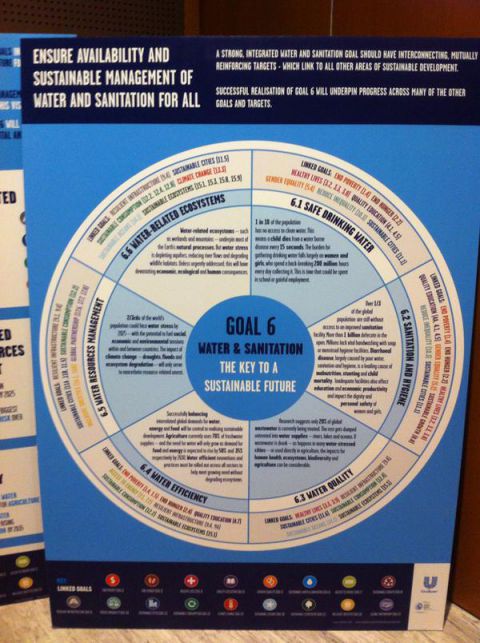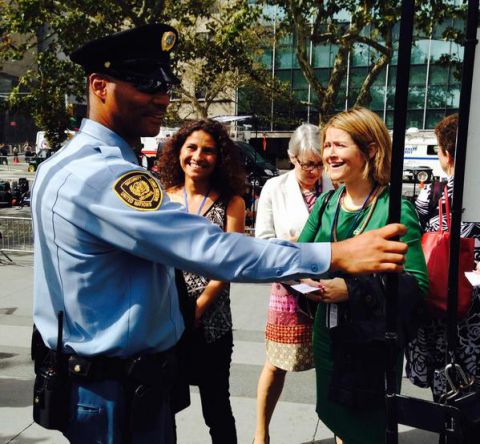‘We need to work together to achieve this ambitious agenda!’
Insights following the United Nations Sustainable Development Summit and the adoptions of the new Global Goals. Blog written by End Water Poverty member, Nathalie Senguin of Freshwater Action Network- Mexico (FAN-Mex), October 2015

Goal 6 on water and sanitation: the key to a sustainable future! Photo courtesy of Twitter @FANMex
After all the time spent debating and drafting, the long-awaited formal adoption of Agenda 2030 and the Global Goals took place in less than one minute. “Whoever says the United Nations is not effective, this proves the contrary” joked Michel Jarraud, Secretary-General of UN Water, at the Water High Level side event entitled ‘Making it Happen: ending inequalities and ensuring sanitation, water and hygiene for all as a basis for achieving the SDGs (#wateris)’ after the Sustainable Development Summit.
In an agenda where most of the sustainable goals depend on the one resource we all need on this planet to live – water – it is all too often taken for granted and there were surprisingly few mentions of water during the official Summit. One of them by the Pope, but he too needs to understand that there cannot be access to water without ensuring equitable access to sanitation and hygiene conditions, if we want to be coherent and achieve the targets of the global goals in a truly sustainable manner.
The integrative aspect of this agenda has not been stressed enough in the text, laying out our future. It is for all of us – citizens, civil society organisations, inter-governmental organisations, governments themselves and all other stakeholders – together, we must foster true integration to ensure that we can achieve this ambitious agenda. This is why cross-sectorial collaborations are crucial.
Water, sanitation and hygiene, have a direct linkage with health, and working together to systematically improve access for all on both issues, is a critical priority. Not only because water quality is essential to maintaining a healthy life, but also for so many other concerns, such as health facilities themselves needing safe water, sanitation and hygiene conditions and facilities. Nearly 40% of healthcare facilities in low and middle income countries do not have access to safe water. “Only 3% of the health budget is for prevention. How can we talk about sustainable development, if we don’t have water and sanitation? At the end of the day, this agenda should be about human rights” shared Maria Naira, Director of Public Health and Environment at the World Health Organization.
Thomas Gass, Assistant Secretary-General for Policy Coordination and Inter-Agency Affairs in the Department of Economic and Social Affairs (UN DESA) openly recognized the limitations of the previous Millennium Development Goals. “We need to target those most in need. We simply cannot hide behind ‘average’. We need to strengthen the links between duty bearers and rights holders”, he stated at a session aptly entitled “Partnership for Accountability”. For us to truly implement this, he reinforced that “we will require a different approach – a change of mindset – as we have to create systems that are open”.
In an important and progressive move, representatives from different sectors and human rights areas, including education, women and children, health, energy and water and sanitation, all participated in an inter-sectorial panel discussion. Sharing her experience on accountability and working in together, gathered from her role in the Sanitation and Water for All Partnership, Catarina de Albuquerque recognised that “we need to be more interconnected amongst the different sectors”. All agreed that it is time to move and act together. Water is at the heart of the implementation and realisation of so many of the global goals, and is critical to a sustainable future.
But the inter-linkages can also be very negative if definitions are not clear, and consequences of connections not carefully examined. Dirty and thirsty energy technology production, such as toxic mining and hydraulic fracturing (known as fracking) are not banned from the clean, modern and sustainable solutions envisioned to achieve Goal 7 to Ensure access to Energy. This will have a direct impact on water systems, and will have incredibly negative consequences on access to water and sanitation, if left unchecked or without controls.
Access to information will be fundamental to assure that our water, soil and air is safe for people and the planet. It is therefore also very important to have initiatives, such as the Open Government Partnership, to keep fostering governments to ensure citizens access to information. The initiative started with 8 countries and actually has 66 participating. Ambassador Samantha Powers from the USA clarified “the Open Government Partnership is not only about Goal 16. It is also about water, education and so many other SDGs.”
Together we can achieve the change we want to see in the world. Together, we can realise the global goals.

Nathalie Seguin (FAN-Mex) and Catarina de Albequeque (SWA) entering high security UN Summit, September 2015. Photo courtesy of Twitter @MargaretBatty, WaterAid